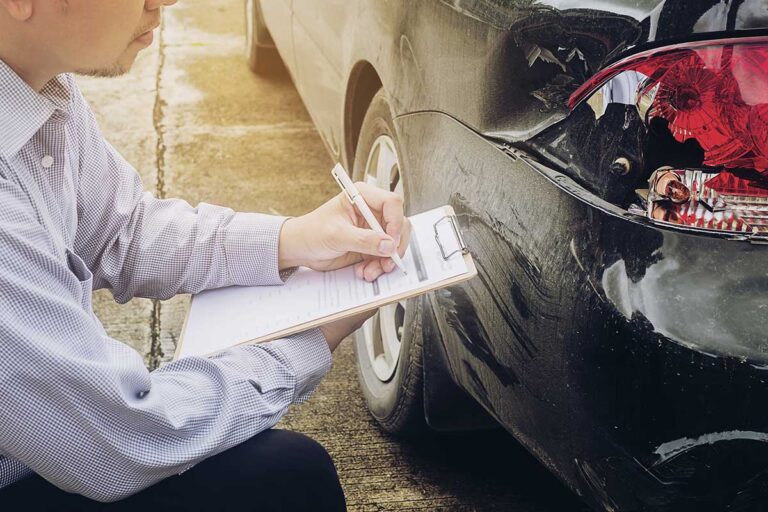Decoding Fault and No-Fault Insurance in Georgia
When navigating the complexities of personal injury law, it is crucial to grasp the concepts of “no-fault” and “fault” insurance as they pertain to automobile claims. These frameworks influence how claims are processed and determine the options available to victims seeking financial recovery after a car accident. If you become involved in a car accident in Georgia, you may question whether the state operates under a fault or no-fault insurance system.
As we explore Georgia’s insurance system, it is crucial to grasp the foundational principles of fault and no-fault insurance and the implications for drivers, insurers, and the legal framework. This understanding will set the stage for a more informed discussion about Georgia’s current insurance requirements, coverage options, and how they compare to those of other states.
Injured In A Car Wreck? Contact Us For A Free Consultation
Injured In A Car Wreck?
Is Georgia a No-Fault State?
No, Georgia does not operate as a no-fault state. The state operates under a fault-based system, which places financial responsibility for bodily injury and property damage squarely on the driver who caused the accident. This means that if a car accident in the South Atlanta area wasn’t your fault, you have the right to pursue compensation directly from the at-fault driver or their insurance company.
Compensation may encompass various damages including medical expenses, property repairs, physical pain and suffering, emotional distress, among other non-economic losses. However, proving these claims can be challenging, therefore consulting with a knowledgeable South Atlanta personal injury lawyer is essential. For over ten years, the attorneys at The Jewkes Law Firm have been assisting victims in recovering from car accidents.
The Basics of Fault and No-Fault Insurance
Understanding the distinctions between insurance systems is essential for anyone involved in an auto accident. In no-fault states, drivers must carry insurance that covers their own injuries, regardless of who caused the accident. No-fault systems simplify the process by allowing individuals to seek compensation from their own insurance providers, thereby minimizing contentious disputes and ensuring timely assistance for injured parties. This system limits the ability to sue for damages, allowing compensation only in severe injury cases.
No-Fault Insurance
No-fault insurance promotes prompt and efficient claim payments, regardless of fault. Drivers are mandated to carry insurance that covers their own injuries and damages in a no-fault system. This allows them to receive compensation for medical expenses and lost wages without having to establish the liability of another driver. The primary objective of this system is to simplify the claims process and alleviate the burden of extensive litigation following vehicle accidents.
The introduction of no-fault laws in the United States began in the 1970s as a response to the rising costs and complexities associated with traditional liability insurance. Proponents of a no-fault system contend it lessens the financial strain on the legal system and facilitates quicker recovery for those injured in accidents. Over the years, numerous states have enacted their own variations of no-fault insurance, each with distinct rules and regulations governing claims processing and compensation.
At-Fault Insurance
Conversely, in a fault-based system, like Georgia’s, the driver deemed responsible for an accident must cover the damages incurred by the other party. This allows injured parties to seek compensation directly from the at-fault driver or their insurance provider. Victims can claim various damages, including medical expenses, lost wages, and pain and suffering. This system often leads to disputes over liability and can result in protracted legal battles.
Navigating Comparative Negligence in Georgia
In certain incidents, multiple drivers might be held responsible for the collision. A “modified comparative negligence” rule affects how Georgia calculates compensation. Your potential recovery is reduced by the percentage of fault assigned to you under this system. For instance, if your damages amount to $10,000 but you are found to be 30% at fault, your recoverable amount would be reduced to $7,000. If you are determined to be 50% or more at fault, you will be barred from recovering any damages from the other party. A skilled personal injury lawyer can assist in challenging any claims of shared fault.

Georgia’s Insurance System
Current Insurance Requirements in Georgia
In Georgia, all drivers must maintain a minimum level of liability insurance to legally operate a vehicle. In Georgia, the law mandates minimum liability insurance coverage of $25,000 per individual and $50,000 per accident for bodily injuries, along with $25,000 for property damage. This requirement ensures that drivers can cover the costs of injuries and damages they may cause in an accident. Additionally, Georgia law permits drivers to opt for a certain level of uninsured motorist coverage, providing extra protection in accidents involving uninsured drivers.
Types of Coverage Available
Beyond the basic liability coverage required by state law, Georgia drivers have access to various insurance options that further protect themselves and their vehicles. These options include:
- Collision Coverage. This insurance pays for damages to a driver’s own vehicle in the event of a collision, regardless of fault.
- Comprehensive Coverage. This policy covers damages to a vehicle from non-collision-related incidents, such as theft, vandalism, or natural disasters.
- Uninsured/Underinsured Motorist Coverage. This optional coverage protects drivers in accidents involving a driver who lacks sufficient insurance coverage to pay for damages.
- Medical Payments Coverage. Known as MedPay, this insurance helps cover medical expenses for the driver and passengers, regardless of fault.
- Personal Injury Protection (PIP). While not required in Georgia, PIP offers additional coverage for medical expenses and lost wages after an accident, providing financial support regardless of who caused the incident.
Comparison with Other States
Georgia operates under an at-fault insurance system, setting it apart from no-fault states where each driver’s insurance covers their own injuries irrespective of fault. In Florida or Michigan, drivers are compensated for medical expenses and lost wages through their own insurance companies. Thus, minimizing litigation and streamlining the claims process in no-fault states. In contrast, Georgia’s at-fault system allows injured parties to pursue legal claims against the responsible driver, potentially leading to higher settlements but also resulting in more complex and lengthy legal proceedings.
Need a Free Consultation? Need a Skilled Attorney?
Free Consultation
Call (770) 771-5130
If you’ve been injured, you need to hire the best legal care to assist you with your claim. Get a FREE consultation today!
Implications of No-Fault vs Georgia’s Fault System
The distinction between no-fault and at-fault insurance systems has significant implications for drivers, insurance companies, and the legal landscape surrounding automobile accidents. Understanding these implications can empower consumers to make informed decisions regarding their coverage and navigate the aftermath of a collision.
For instance, insurance premiums in no-fault states can be higher due to broader coverage requirements, while at-fault states like Georgia may see varying rates based on individual driving records and accident histories. Moreover, the legal landscape in Georgia necessitates a more in-depth understanding of fault and liability, influencing how drivers navigate accidents and insurance claims. Overall, Georgia’s insurance framework reflects a traditional approach that prioritizes accountability and the right to seek damages through the legal system.
The fault system in Georgia significantly influences the claims process following an accident. One of the primary considerations post-accident is determining who is at fault, as this directly affects your ability to claim compensation. Furthermore, Georgia’s system allows greater flexibility for injured parties, as individuals can choose to file claims with their own insurance, the at-fault party’s insurance, or even initiate a personal injury lawsuit.
Engaging a skilled car accident lawyer is crucial. They can assist you in gathering and preserving vital evidence to establish the other party’s negligence. This evidence can include police reports, dashcam footage, eyewitness statements, and your medical records, all of which are instrumental in substantiating your personal injury claim.
Impact on Insurance Premiums
One of the most immediate effects of a no-fault system is its influence on insurance premiums. In states with no-fault laws, insurers often enjoy a more predictable loss environment since they must pay for their policyholders’ medical expenses and other damages regardless of who caused the accident. This can lead to lower rates over time, as insurance companies can better manage their risks.
Conversely, in Georgia’s at-fault system, the responsibility for damages falls on the driver who caused the accident. This can result in higher premiums for those deemed at fault, as their insurance provider may face increased payouts. Consequently, Georgia drivers may experience fluctuations in their insurance costs based on accident frequency and severity, creating a more volatile market compared to no-fault states.
Effects on Legal Claims and Settlements
The legal ramifications are profound. In no-fault states, individuals are generally barred from suing the other party for damages unless they meet specific injury thresholds. This restriction can reduce the number of lawsuits filed, streamline the claims process, and allow for quicker settlements.
In contrast, Georgia’s at-fault system permits individuals to pursue legal action against the responsible driver for damages that exceed their insurance coverage. This can foster a more adversarial environment, where legal battles are common, and settlements may take longer to achieve. The potential for litigation can also complicate the claims process, requiring individuals to navigate the intricacies of fault determination, insurance adjusters, and potentially lengthy court proceedings.
Consumer Perspectives and Experiences
From a consumer standpoint, the choice between insurance systems can significantly shape personal experiences following an accident. In no-fault states, drivers often feel greater peace of mind because they know their medical expenses will be covered without needing to establish fault. This can lead to a more straightforward recovery process, allowing individuals to focus on healing rather than navigating legal complexities.
Conversely, consumers in Georgia may experience heightened uncertainty and frustration following an accident. With the responsibility for damages resting on the at-fault driver, the emotional strain of determining fault can weigh heavily on those involved. Additionally, the possibility of increased premiums due to an at-fault accident can lead to anxiety about future financial implications.
Ultimately, the implications extend beyond mere financial considerations; they encompass the overall experience of drivers and their ability to recover from accidents. As Georgia continues to evolve in its approach to insurance, understanding these implications will be crucial for consumers navigating the often-complex landscape of auto insurance.

GEORGIA PERSONAL INJURY LAWYER NEAR ME
Seek Legal Assistance After a Car Accident in Georgia
Georgia’s fault-based insurance system undoubtedly affects the dynamics of car accident claims. While it allows for potentially higher compensation, it also necessitates a thorough demonstration of fault.
If you or someone close has suffered injuries due to an accident—reach out to our personal injury lawyers for a complimentary consultation. Our legal professionals will support and advocate for you to protect your rights and ensure you have a fair opportunity to secure compensation.
For further information or assistance—please contact The Jewkes Law Firm’s personal injury lawyers at (770) 771-5130 today—to schedule your free case evaluation.




